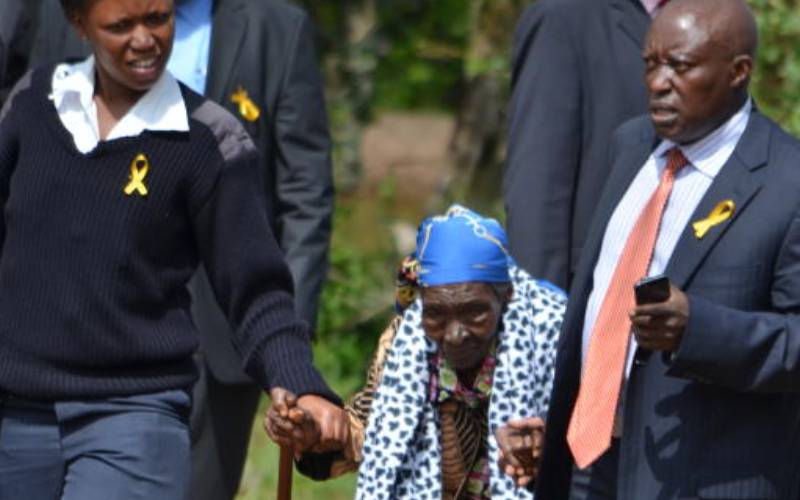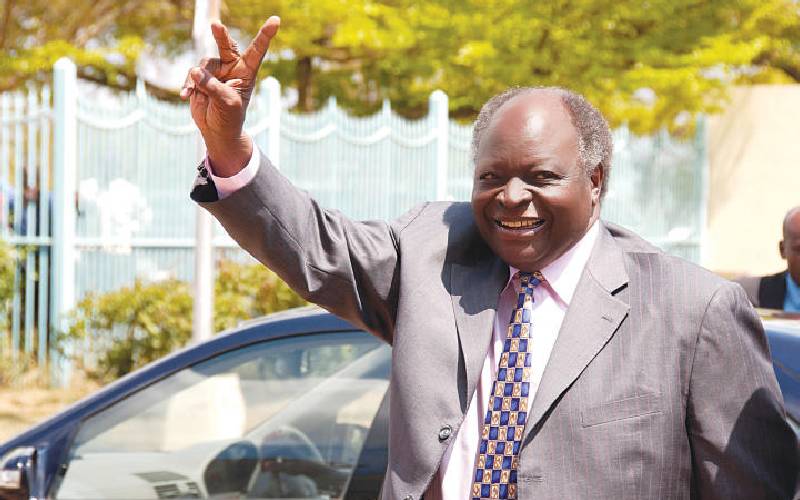
Esther Waitherero was 10 years when her brother Mwai Kibaki was born, and she was at hand to give anecdotes on his early moments.
She looked frail from a distance, but was surprisingly energetic as she went about her daily chores of picking tea on her Gatuyaini village farm. "I still remember the day he was born (November 15, 1931). It was early in the morning before the sun rose. Our mother had woken up early to milk the cows but she could not finish. She went into labour and the boy was born.
"The midwife came and found him already crying. She lifted him up and he was named Mwai, after our mother's brother. His placenta was buried near the gate and then women celebrated with five ululations for a kahii (a boy)," she narrated, with a surprisingly easy manner for her age, the events that took place that morning at Gatuyaini village, a few kilometres from Othaya town.
Kibaki's mother was called Teresia Wanjiku, and his father Kibaki Githinji. He had a stepmother, also named Teresia Wanjiku.
Mwai Kibaki was the last born of his mother. Ahead of him were Philip Githinji, Kinyua Kibaki, Anastasia Wangui, Waruguru Kibaki (all deceased), Waitherero and the second-last-born brother Bernard Nderitu. The task of taking care of Kibaki and his brother, Nderitu fell on Waitherero, who assisted their mother while she was in the farm.
"Our mother would go to the shamba and leave me to take care of the two boys. One was slightly older than the other and they were troublesome! My work was to roast mitahato (bananas) and feed them. I would chew the bananas until they were soft then feed them this way...," she said, showing how she launched the chewed repast with her index finger to nourish the future president.
"Mwai became fat. He always ate more than his elder brother, who was always playful and grew thin. When they had fed I would lull them to sleep, carrying the big one strapped on my back and Mwai on the front.
"He always slept well when he had eaten. If they refused to sleep, I would pinch their bottoms and they had to sleep and then I rest until they wake up."
Waitherero laughed out loud and enjoyed telling the story immensely, interjecting with fond comments of how she missed her brother.
She remembered that it was a sad day when Kibaki was enlisted to start school. His father, Kibaki Githinji, had to be persuaded by a delegation of village elders to release one of his sons to attend school. He saw better value for his sons in grazing his cattle and goats.
"My mother wept and we all wept. We did not want him to go away from home and Mwai was liked by everybody. My mother even said he was too small to walk the distance to school, but our father's word was final." That was 1939 when Kibaki was aged seven years.

His mother went to the only tailor then at Othaya market and bought the little boy one pair of khaki shorts and a shirt for not more than 50 cents for both. Fifty cents was also the school fees per term. He was kited to join Gatuyaini Primary School, which would see him study through Sub 'A' and Sub 'B', the preliminary classes before one could join Karima School for primary school proper. Kibaki would walk to school, a couple hundred metres from his home.
His brother Bernard Nderitu narrated. "We did not envy him for going to school because they wrote on the soil with a finger. There were no books for that level of school. Those of us who were not in school were happier and laughed at the ones who were schooling. If I had been the one chosen to attend school probably I would have refused. But our father could never have allowed it."
Nderitu's earliest memory was that of sibling rivalry when the future president was born. "I was still suckling. We used to suckle until another child was born. His birth meant that I had to stop suckling and I remember I cried a lot.
"When we grew up our first chore was to go to the fields to herd goats and cattle. Mwai liked following me, even when he was too small to graze. The only clothing the boys wore was a khaki shirt, bought at the Othaya tailor, but no shorts for those not going to school. Shorts were for bigger boys only.
"The shirt covered the top but left the bottom bare. But we never cared, life was easy and cheap," says Nderitu.
After completing Sub 'A' and 'B' at Gatuyaini, Kibaki was admitted to Karima Mission School, then ran by the Holy Ghost Catholic Missionaries. There he would attend Standard One, Two and Three and then proceed to Mathari School for Standard Four to Six.
[This story was first published on January 19, 2003]
 The Standard Group Plc is a multi-media organization with investments in media platforms spanning newspaper print
operations, television, radio broadcasting, digital and online services. The Standard Group is recognized as a
leading multi-media house in Kenya with a key influence in matters of national and international interest.
The Standard Group Plc is a multi-media organization with investments in media platforms spanning newspaper print
operations, television, radio broadcasting, digital and online services. The Standard Group is recognized as a
leading multi-media house in Kenya with a key influence in matters of national and international interest.

